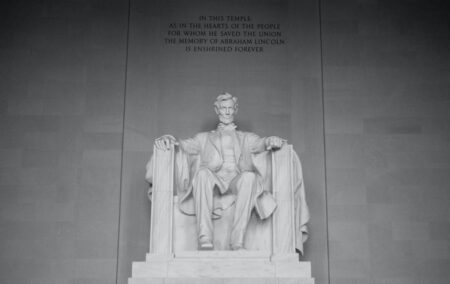Nelson Mandela is important for what he was. FW de Klerk is important for what he did. Because of history, Mandela was largely powerless except in a symbolic way, whereas De Klerk wielded supreme power. Mandela is remembered for his grace, De Klerk for his actions. The closest parallel to De Klerk I can think of – an imperfect one – is Abraham Lincoln.
Both De Klerk and Lincoln became leaders of countries ruled by white men, and both inherited the sins of their fathers. In the United States, the sins were slavery and the annihilation of most Native Americans. In South Africa, the sins were European conquest and apartheid. Lincoln ended slavery; De Klerk ended apartheid. Neither ending was inevitable. Both might have taken far longer had it not been for the courage and skill of these men.
Hatred of slavery
Lincoln became president in March 1861. It seems he had always hated slavery but his immediate concern was only to stop its spread to the new territories in the west. He declared he had no intention to abolish slavery where it existed. Southern slave owners thought he was lying and were probably right. When the southern states began muttering about wanting their own way, Lincoln’s highest priority was to preserve the Union, to keep southern and northern states together. His worst fears were realised when civil war broke out in April 1861.
De Klerk was elected president in September 1989. At the time he gave no inkling of his aims to end apartheid, but effectively did so in a single speech in February 1990. White diehards felt he had cheated them, and were probably right to feel so. He released Mandela, unbanned the ANC, and began the four-year process of negotiation leading to democracy (which meant black majority rule).
The American Civil War, which also lasted four years, was by far the bloodiest in American history, claiming more American lives than both world wars and Vietnam put together. It was between the capitalists in the north, who believed all labour should be hired by voluntary contract, and the slave owners in the south, who believed black labour should be owned. Lincoln was not much good as a military leader but excellent in pursuing clear political aims and reconciling the warring factions. As the war dragged on, it became clear that a northern victory must result in emancipation, but there was nothing inevitable about northern victory. To win, the north had to conquer the south, but the south had only to avoid being conquered. They came close to doing so. The north’s greatest single victory, at Gettysburg in July 1863, had no bearing on the outcome of the war. By August 1864, after military reverses, Lincoln was close to despair and thought he would lose the coming election. He was saved by his grim, ruthless, efficient general, William Tecumseh Sherman (quite different from the south’s gallant hero, Robert E Lee), who took Atlanta in September 1864, and by Sheridan winning in the Shenandoah Valley. The south surrendered. Lincoln won a big majority in the presidential election in November.
White diehards
De Klerk’s greatest danger, like Lincoln’s, was from the white diehards. This is important to realise. In 1990, there was no chance of South Africa continuing as before. There were only two options: black majority rule, as had happened all over sub-Saharan Africa, with the results everyone can see; or a hardline white racist rule, caring nothing about the economy or world opinion but only about keeping white power. White South Africa had the physical means to crush any black resistance. The ANC were good at terrorising unarmed black people but useless at fighting armed men, and they knew it. Their “People’s War” was against other black parties; they assumed that the whites would soon surrender power and they wanted to be the black party that got the spoils of government. They didn’t seem to realise, which De Klerk did, that some radical whites had no intention of giving way to black rule. During the years 1990 to 1994, De Klerk’s primary aim was to control these white reactionaries. His decisive blow against them was the referendum of 1992, one of the 20th Century’s political masterstrokes.
In the US, Lincoln’s re-election and the north’s victory brought the end of slavery. Lincoln, in my view the greatest US president, was assassinated soon after. Then followed the mess of “Reconstruction” and Jim Crow (continued discrimination against blacks). It took over a century for black Americans to reach full freedom and equality.
Legacy
In South Africa since democracy in 1994, we have had the mess of ANC rule. White liberals like me say that life is better for everybody because of democracy and our good constitution, but I’m aware that many poor black people might disagree. Will it take us a century before our poor black people can live in dignity, security and prosperity?
Lincoln’s legacy is secure. What of De Klerk’s? I think he is a South African hero, who delivered us from apartheid. But he was an enthusiastic agent of the system in his early years. This might either depreciate him or make his conversion all the more admirable. My regard for him continues to rise. I mourn his death.
The views of the writer are not necessarily the views of the Daily Friend or the IRR
If you like what you have just read, support the Daily Friend

